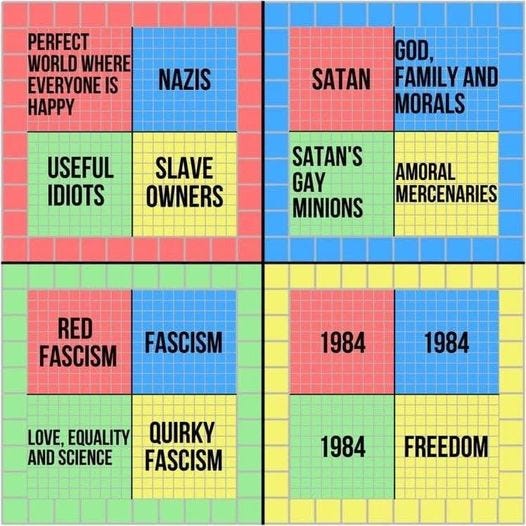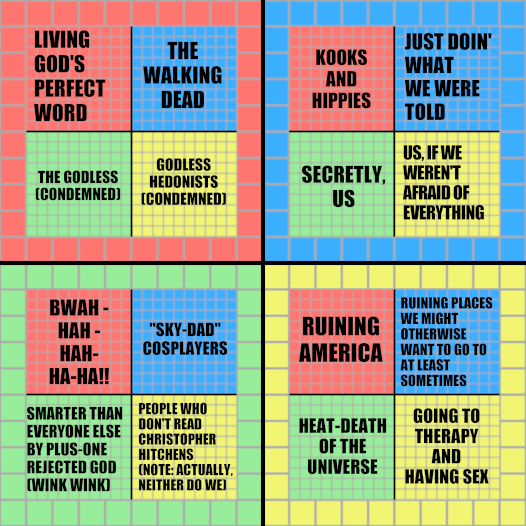These days, I draw strength from thinking about systems. Not human institutions, necessarily. From where I sit, human systems generally seem to be either breaking down, languishing in agnostic and/or stunted states of proto-formation, or in the process of being appropriated for imperial ends, large and small. I draw strength from believing that there are systems that underly and supersede all that, and that these systems are ultimately governing everything that happens.
Metastasis is a term for when pathogenic elements grow out of control. Lysis is a term for when when a systemic unit disintegrates through breaking out of its natural walls. Underneath both of these, there is still the deeper order of biology itself.
It’s possible to trust biology — even if biology includes lysis and metastasis. I’m trying to tune into these types of deeper order, metaphorically speaking.
So, RFK, Jr. to head HHS? Sure. A Fox News host for DOD? Why not? An uncannily Russia-congruent enigma, with an MCU-esque shock of white hair, for Intelligence? Maybe external threats will break America from the inside out. Or maybe we’ll fly apart on our own. Or we’ll gradually rumble down into some contentious mess, leavened by cloying “America’s Got Talent” type TV shows? We’ll see. Not to be glib about the amount of anxiety and genuine suffering that will result. But I think it’s possible to see that unchangeable, underlying mechanisms of life will be revealing themselves in the process, one way or another. And I believe those mechanisms are ultimately good, and that they’re ultimately pointed toward the good.
This is not an argument to “tune out.” It’s an argument to tune in, so those mechanism can work in all of us, too. The task for people of goodwill, I feel, is to seek the best alignment with the underlying systems. To be aware of what it means to be buffeted by all the crap that’s going around now, to figure out how to detox from it, and to get keen about connecting with deeper forms of life-giving structure.
There’s a range of ways to go about this. On one end, there’s the “Cloud of Unknowing” approach, which involves a kind of formless surrender to the higher cosmic forces at work. On some level, macro-level disorder is a phenomenon that can’t be put into neat boxes. When Leviathan appears, you really aren’t in control. Your frames break. The change works you.
On the other end, I think, there’s the idea that no matter how crazy things get, any future social infrastructure will be built by accumulating layers of well-executed, but in some ways relatively humdrum daily practice. Even if we feel that macro-level crises are happening beyond our control, to no small extent we remain nimble and effective within our own sphere of influence according to our rubrics and our discipline.
Worth noting, too, that large-scale social infrastructure is regularly built out of spiritual infrastructure. And so, as institutions are being rocked in our time, it makes a certain amount of sense to do as some people are doing, and curl in around spiritual traditions to see what remains solid and useful there — without getting caught in the stale or lifeless parts that have been causing people to trickle away for a century or more. This is what I’ve been trying to do the past few years, though I’m no longer sure how long I’ll continue to do it.
Either way, something that’s been coming to mind in regard to all of the above this week, though a little dusty and old-fashioned, is the Wesleyan quadrilateral of scripture, tradition, reason, and experience. As a college student in eighteenth century England, John Wesley was part of a small group committed to pursuing a devout spiritual life. Under his leadership the group grew, flourished, became known for dramatic and emotional conversions, and through Wesley’s guidance Methodism emerged and, eventually, the several denominations of Methodist churches.
As an eighteenth century Christian, Wesley saw cosmic reality mainly in terms of the Christian narrative. For him, and the Methodism that followed, scripture was the authoritative ground for encountering the divine. I’m don’t think it’s possible for a thoughtful person today to rely quite so heavily on scripture, and I’m not sure it’s possible for a thoughtful person to articulate a complete cosmological view in purely Christian terms — at least not as they’ve ever been articulated within the Church to date. But I do think the four domains that he distinguished continue to be useful.
In the broadest sense — sort of lifting these terms out of Wesley’s hands and turning them over in my own — it’s interesting to think about the interplay of scripture, tradition, reason, and experience. Just mulling over the words, one might note the reaction to each one of them. Folks tend to be friendlier to some of them than others.
The meme below was posted in a Facebook group on metamodern spirituality this week (original author unknown), taking the piss out of, roughly (from top left to bottom right), the American versions of the far Left, moderate Right, moderate Left, and far Right.
It takes a minute to puzzle it out, but it’s fun, and it makes a key point about our era of lysis and metastasis: With all the balkanizing that’s going on, folks have drawn in around the tribes that have formed over the past few decades. Each tends to see her tribe as being calibrated at zero tends to see herself under siege in a world of other, crazier ideologies.
But when you zoom out, you can start to see the suggestion that the path to victory lies not in a strict allegiance with one of these camps, per se, and not through a thoughtless equivocation between all of them, either, but in the ability to work effectively with all of them — toward a truly greater, more clear-eyed integration.
You could do the same thing with (from top left to bottom right) scripture, tradition, reason, and experience. In the very broadest sense, each of these has its preferred adherents in today’s cultural landscape, and each these has its characteristic allergies to the other camps.
Maybe the folly of trying to win through allegiance to any one camp is apparent here, too? I think it’s useful to consider that something life-giving comes from a transcending interplay of all of them.
. . . Which is what John Wesley said. (Though he, and Methodists in general, tend to be located in the top left corner.) We might take Wesley’s basic rubric and go somewhere somewhat different from where he went with it.
There’s a lot more to say, but I’m experimenting with making these posts a little more bite-sized, and I think I’m going to stop here for now. In the meantime, I think there are a few basic questions:
What is there to love about ancient texts? What is there to love about traditions in our lives? What is there to love about reason? What is there to love about learning from experience?
In a following post, there will be some thinking aloud about some of the basic tensions between these: characteristic follies and some of the characteristic allergies between them, and the life-giving things that might happen if we get over those aversions.
Discussion about the Wesleyan quadrilateral continues here and here.




